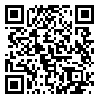BibTeX | RIS | EndNote | Medlars | ProCite | Reference Manager | RefWorks
Send citation to:
URL: http://jams.arakmu.ac.ir/article-1-2993-en.html
2- Department of Psychology, Hamadan Bu Ali Sina University, Hamadan, Iran
3- Department of Psychiatry, Arak University of Medical Sciences, Arak, Iran
4- Department of Family Therapy, Family Institute, Shahid Beheshti University, Tehran, Iran
Background: Impulsivity is a core social pathology. Therefore, the purpose of this study was to Effectiveness of group dialectical behavior therapy based on core distress tolerance and emotion regulation components on Expulsive Anger and Impulsive Behaviors.
Materials and Methods: Research method is a semi experimental socio-statistic approach consisting of experimental group (dialectical behavior therapy) and control group. Participants were patients referred to Amir Kabir Hospital in Arak. and who were Expulsive Anger and Impulsive Behaviors. Based on stratified random sampling, 16 patients (women) were placed in each group. Research tools included the structured diagnosis interview according to DSM-IV-TR (2000), Barrat impulsivity scale (1994) Distress Tolerance Scale (2005) Difficulties of Emotion Regulation Scale (2004) and dialectical behavior therapy were done for two months, 8 groups Sessions.
Results: The results of this study showed that there was significant difference between control and experimental groups after implementation of dialectical behavior therapy relying on component tolerance and regulation of emotional distress variables impulsive behavior and explosion furies (p<0.01).
Conclusion: Distress tolerance and emotion regulation components effective on Expulsive Anger and Impulsive Behaviors.
| Rights and permissions | |
 |
This work is licensed under a Creative Commons Attribution-NonCommercial 4.0 International License. |





